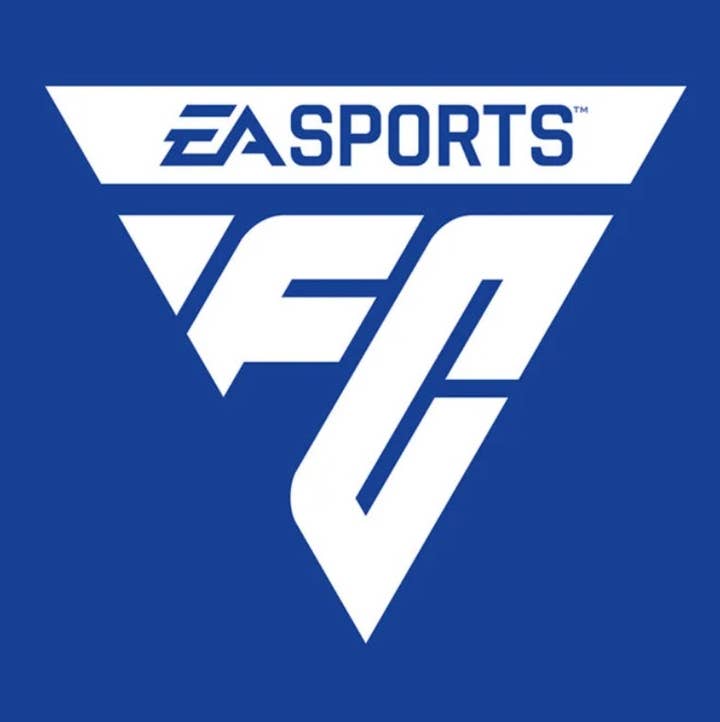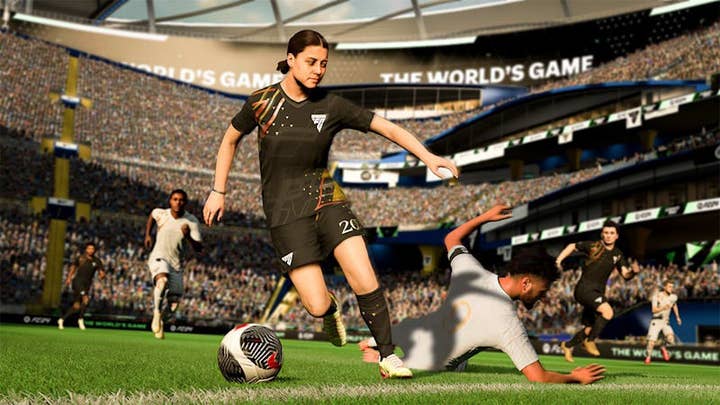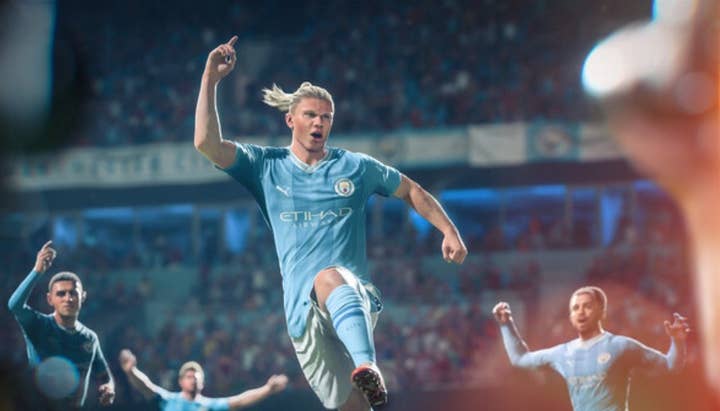Life after FIFA: The birth of EA Sports FC and its mission to find 1bn fans
"We're going from a video game built out of football, to a football platform built from a video game"
Back in 1993, EA's European office had obtained the FIFA license.
The group had managed, eventually, to persuade their parent company to let them make a football game. EA was a US-centric business at the time and football had collapsed in the country, so the publisher was hesistant. In the end, the project was greenlit, with a small team in Canada tasked with making the game.
The creation of FIFA is a remarkable trans-Atlantic story, and one for another day. But from there, the series went about transforming the world of sports video games (not to mention music in games, too). It had a fierce battle with Pro Evolution Soccer, it changed things again with the birth of Ultimate Team, and it has firmly established itself as the biggest game in most countries worldwide.
But that is all about to end. Starting today, the FIFA video game is no more. EA Sports FC is the new face on shelves. But EA tells us that this new entity will continue the legacy of what came before.
"It's a journey that started back in April where we revealed our new logo," says James Salmon, senior marketing director for EA Sports.
"We revealed FC24 in Amsterdam, and I was reminded when I was there of a poignant quote from Johan Cruyff, where he said: 'to accomplish things, you have to do it together.' And we've been in the most privileged position that all of our 300-plus partners across the world of football have united with us as we've guided through this transition.
"It was critical we ensured that fans understood what FC represents, and also those partners understand that as well, which is the experience that they know and love is still going to have all the same values that we've had historically."

Those values are three-fold. First, there's 'authenticity', which is all around having real player names, stadiums, leagues and so on. Salmon reminds me that they have 19,000 players, 700 clubs and 30-plus leagues in the game, covering both the men's and women's leagues.
Then comes innovation, which is this idea that it can't just do the same game every year. This year Salmon talks up a new feature called HyperMotion V, which uses volumetric data captured in stadiums from all the major leagues to enable significantly more animations in the game.
I've heard of those two values before. The third was new to me.
"The last one is 'purpose'," says Salmon. "There is a misconception within video games, and specifically our video game, that we're detractive from the real world of the sport. Whereas our research suggests the opposite. 63% of our players, the majority of them, are playing more football as a consequence of their interactions with our game. And we haven't intentionally forged that historically. But we are doing that now through our plan to invest $10 million in grassroots football through FC Futures."
"Our ambition is to create the world's largest football club"
He continues: "The lines between virtual and real are ever blurring. And there's a really interesting thing we're seeing within our experiences that we call the W effect. This is where ahead of a big match [in the real world] we will see more fans engaging in that game. I'll use El Classico as an example. So Real Madrid fans will be going in and playing as Real Madrid [in FIFA], then when the [real] game kicks off, they will hop on to TV or streaming to watch the match. And then we see a small spike at halftime where fans come back into our experience, before another steep drop off. And then at the end of the game, those same Real Madrid fans, they either want to correct what they've seen, because they lost, or they want to celebrate the fact they've won. You're seeing from that a blending of what the modern football fan does."
The downsides to changing a brand you've spent 30 years building up is clear. But there are opportunities, as well. EA can now build out something far more ambitious that is entirely its own, and not shared with the brand owner.
"Our ambition, and it's a lofty aspiration, is to create the world's largest football club," Salmon says. "We want to see an ecosystem of a billion fans. And to accomplish that, we need to go beyond just being a video game built from football, and to become the football platform built from video games.
"This was all part of the 'FC' philosophy, but also in how it's grounded in community. Because whenever I hear the words 'football club', I immediately think of Portsmouth, the team I support, and the community that involves. We are in this incredibly fortunate and privileged position to be serving a huge community of fans globally. And our ambition through this transition is to serve even more."

I suggest whether that means people being able to watch a real-world match within EA Sports FC, and although that might be something the company could explore, it's not just about bringing things into the platform, but the platform being used in the wider world of football.
"For example, the use of technology within coaching, and how our platform can be used to support players further with their development," Salmon says.
"We've entered into a partnership with UEFA around investing in grassroots football, and how we can use the FC in-game training drills to support coaches, to support parents and to support players by taking those in-game practices and putting them onto the training field. We're showing them to young people, and to adults, to better articulate a way a practice might work.
"And we're working with a wealth of ambassadors such as Ian Wright and Emma Hayes and Fernando Morientes, to lend their voices to those practices. And I think all of that points to the role that games and technology can play in advancing the sport. We want FC to represent that."
There are other opportunities now they're outside of the FIFA brand, too.
"We had a very successful partnership with FIFA," Salmon reminds us. "The exit certainly wasn't as acrimonious as perhaps has been reported some in some places. We're proud of what we accomplished.
"But we have an amazing opportunity now to do other things, because we don't have that licensor and we don't have that name on the cover of our product. A great example is the campaign that we launched with Nike called Mad Ready. FIFA rightfully have other licence partners, Addidas being one of them. And we will continue to work with Addidas. But some of the athletes that we partner with within this Nike/Mark Ready campaign, we're able to activate that in a different way than we would have done previously.
"We're also in a position where things like our esports ecosystem, FC Pro, is something that's driven, ran and led by EA as a sole entity. Whereas previously with the FIFAe World Cup, there was a connective nature to the way that operated. So there's more freedom, that's for sure."
EA has worked hard to try and establish the EA Sports FC brand. It's worked with COPA90 on the strategy, and the design agency Uncommon to give it the right look (using the 'triangle' motif that is synonymous with the sport). It's spending big on advertising and did a huge reveal event in Amsterdam.
"The exit [from FIFA] certainly wasn't as acrimonious as perhaps has been reported"
Yet when it comes to a game as wide-reaching as FIFA, it'll take time for the new brand to settle in. And there may be confusion amongst some of the game's audiences to begin with. Salmon acknowledges that there may be a short-term impact, but believes it'll be worth it in the long-run.
"I'm going to completely zoom out for a second and say that the start point is this aspiration to create the future of football fandom, and our core purpose, which is to inspire the world to love football," he tells us. "And we talked publicly about our aspiration to grow our platform to being a billion football fans. In the short term [the overall performance] remains to be seen. We're going through the launch right now. But our aspiration, and as we go through this transition, is to grow."
Whether EA Sports FC24 matches the sales of past FIFA games remains to be seen, but it's safe to say we're still looking at one of the biggest video games of the year. What Salmon is actually most wary about is around what we were talking about at the start regarding the history of FIFA games. It's not just about its commercial impact, but that emotional legacy, and carrying that forward into this new era.
"I grew up playing FIFA with my father, and this week I played FC for the first time with Rosie my daughter," Salmon concludes.
"And that connection is a very real thing. We needed to be sure as we were going through this transition that the fans understood that the experience that they know and love, and that they connect with on that emotional level, is not going to be changed or ruined. All of that authenticity, all of those players, clubs, leagues, all of that innovation, all of that immersion, was going to be part of this. And not only that, but also we could use this as a moment of change to, as I mentioned already, go from being a video game built out of football to being a football platform built from a video game."

